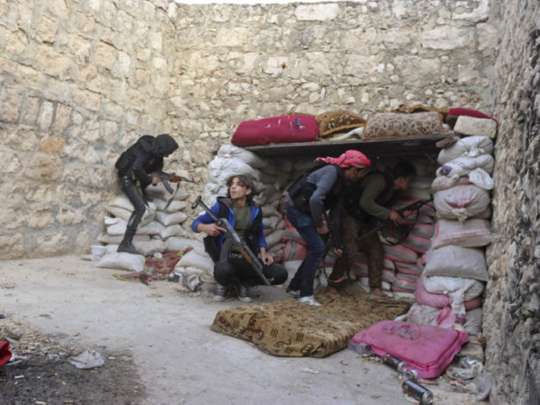
Washington: The US military will subject Syrian rebels taking part in a new training programme to psychological evaluations, biometrics checks and stress tests under a screening plan that goes well beyond the steps the United States normally takes to vet foreign soldiers, a sign of the risks the Obama administration faces as it expands support for armed groups in Syria.
Officials said the screening programme, developed chiefly by US Central Command (Centcom), would rely on what was described as a “common core” of screening protocols, including running trainees’ names through US and foreign intelligence databases, collecting biometric data, and, when possible, seeking information from fighters’ home communities. Rebel commanders would be subject to additional screening.
“In the special operations community, we have a pretty long history of vetting and screening surrogate forces that we’ve worked with,” said an official at Centcom, who like others spoke on condition of anonymity to describe planning.
“But this is unique to Syria, because we’re going to work with folks that we won’t accompany once we employ them,” he said. “So vetting and screening becomes even more important.”
The effort to develop a layered vetting process is an attempt to mitigate the hazards associated with deepening US involvement in Syria’s chaotic battlefield, where a dizzying array of armed groups have been accused of abuses against soldiers and civilians alike.
While the Obama administration has sought since 2011 to foster a competent force to fight Syrian troops and, now, Daesh, US officials remain wary even of fighters whose objectives currently align with their own.
In particular, officials want to lessen the risk that US-trained fighters sent back into Syria to combat Daesh will use their weapons on civilians or - like the Afghan mujahideen fighters whom Washington backed in the 1980s - later turn against the United States and its allies.
Under the plan, which has not been finalised, so-called moderate fighters would be evaluated on an ongoing basis. Successful participants would gradually attain access to higher levels of training and weaponry, and fighters found to be wanting would be dismissed from the programme.
“We’re taking it extremely seriously,” a senior US defense official said. He said fighters would also be educated about laws of armed conflict.
The screening for the Syrian fighters is also aimed at ensuring that militants aligned with Daesh or other extremist groups do not infiltrate US-sponsored training.
US officials have said that training will occur in Saudi Arabia, Turkey and two other countries. Some training is already believed to be happening in Qatar, while training might also take place in Jordan, a close US ally where the United States has previously trained special forces from other Middle Eastern countries.
Recruiting the right rebel fighters may be even more difficult than screening them. US officials acknowledge they do not have as extensive a roster of potential Syrian rebels as they might like, especially below the commander level. Partly for this reason, the United States will work closely with countries hosting the training sites and with other allied countries in the region as they recruit and screen fighters.
Officials overseeing the training programme may also get referrals from other US government agencies that have been working with members of Syria’s opposition in recent years, including the US Agency for International Development.
— Washington Post












